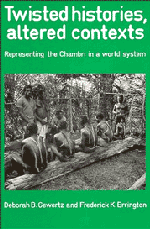Book contents
- Frontmatter
- Contents
- List of illustrations
- Acknowledgements
- Introduction: On writing the Chambri
- 1 The new traditionalism: tourism and its transformations
- 2 The initiation: making men in 1987
- 3 The town
- 4 Western representations at home
- 5 The written word
- 6 Negotiating with the state
- Conclusion: Interlocking stories, intersecting lives
- Appendix A: Godfried Kolly's life story
- Notes
- References
- Index
3 - The town
Published online by Cambridge University Press: 05 June 2012
- Frontmatter
- Contents
- List of illustrations
- Acknowledgements
- Introduction: On writing the Chambri
- 1 The new traditionalism: tourism and its transformations
- 2 The initiation: making men in 1987
- 3 The town
- 4 Western representations at home
- 5 The written word
- 6 Negotiating with the state
- Conclusion: Interlocking stories, intersecting lives
- Appendix A: Godfried Kolly's life story
- Notes
- References
- Index
Summary
Until rather recently, the Chambri experienced the small coastal town of Wewak, the Provincial Capital of East Sepik Province, in terms of transition. From the 1930s through the 1950s, Wewak was a point of departure for the labor migrants on their way to the plantations of New Britain and New Ireland; or it was a place of religious training for the Catholic Mission catechists before they were stationed throughout the Sepik. However, by the early 1960s, Chambri began to travel to Wewak for other purposes and for longer periods of time. They came to supervise their children who, having completed the limited schooling available at Chambri, were attending mission schools in Wewak; or they came to watch out for their kin who were receiving treatment at the Wewak hospital. In order to provide housing for themselves they eventually rented from indigenous landowners a small area adjacent to one of the main roads. Here they built the makeshift houses that formed the nucleus of what became the Chambri Camp.
By the early 1970s, Chambri began to travel to Wewak in ever increasing numbers, usually staying with those kin or co-villagers already there, living in Chambri Camp. They came primarily to earn money to take or send home. But they also came to see what town life was like. Women who came to sell fish might stay several months before returning to Chambri; the men who accompanied them or those who came alone might look for jobs and stay longer.
- Type
- Chapter
- Information
- Twisted Histories, Altered ContextsRepresenting the Chambri in the World System, pp. 101 - 125Publisher: Cambridge University PressPrint publication year: 1991



